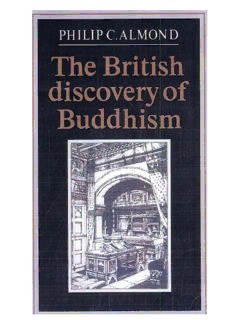
The British Discovery of Buddhism PDF
Preview The British Discovery of Buddhism
The British discovery of Buddhism The British discovery of Buddhism Philip C. Almond Reader in Studies in Religion University of Queensland, Australia The right of the University of Cambridge to print and sell all manner of books was granted by Henry VIII in 1534. The University has printed and published continuously since 1584. CAMBRIDGE UNIVERSITY PRESS Cambridge New York New Rochelle Melbourne Sydney Published by the Press Syndicate of the University of Cambridge The Pitt Building, Trumpington Street, Cambridge CB2 1RP 32 East 57th Street, New York, NY 10022, USA 10 Stamford Road, Oakleigh, Melbourne 3166, Australia © Cambridge University Press 1988 First published 1988 British Library cataloguing in publication data Almond, Philip C. The British discovery of Buddhism. 1. Buddhism - Great Britain - History - 19th century 2. Great Britain - Religion - 19th century I. Title 294.3'0941 BQ709.G7 Library of Congress cataloguing in publication data Almond, Philip C. The British discovery of Buddhism / Philip C. Almond. p. cm. Bibliography. ISBN 0 521 35503 6 1. Buddhism - Study and teaching - Great Britain - History - 19th century. 2. Great Britain - Religion - 19th century I. Title BQ162.G7A45 1988 294.3'0941 - dc 19 87-35506 CIP ISBN 0 521 35503 6 Transferred to digital printing 2003 WS To Monmana Contents Preface page ix Introduction 1 1 The discovery of Buddhism 7 2 Buddhism and the 'Oriental mind' 33 3 The Buddha - from myth to history 54 4 The Victorians and Buddhist doctrine 80 5 Victorian precepts and Buddhist practice 111 6 'The heathen in his blindness'? 132 Conclusion 139 Notes 142 Bibliography 166 Index 181 vn Preface The student of religion has been well served by a number of volumes devoted to the history of Christian thought in the nineteenth century. But very few studies have been devoted to the nineteenth-century interpretations of non-Christian religions, or to the role that these played in the shaping of Victorian culture. This volume is intended partly to fill that gap by examining the creation and interpretation of Buddhism in Great Britain during this period. It is to be hoped that the examination of the way in which Victorian thinkers made sense of the East, and of the means by which Victorian Christians came to terms with an alien tradition both complementary to and opposite to their own, will cast some new light on a period which was seminal for the development of contemporary Western religious pluralism. To a large extent, I have allowed the interpreters of Buddhism to speak for themselves. At one level, this is a means to show forth the subtle and complex connexions between the network of texts which comprise Victorian discourse about Buddhism. But at another level, a deeper one, it is intended to evoke in the reader not only a cognitive apprehension but a sense of, and a feeling for, those aspects of the discourse that are uniquely Victorian. My intention has been to supply as much detail as space allowed to enable the reader personally to encounter Victorian Buddhism. I should like to express my thanks to a number of people: to Pro- fessor Charles Long for a number of stimulating conversations; and to my colleagues Dr Richard Hutch and Mr Rod Bucknell who read earlier drafts of this study and made many helpful suggestions. I am grateful too to Mrs Roni Hawkins for typing the manuscript. P.C.A., Brisbane, April 1987 IX
Description: